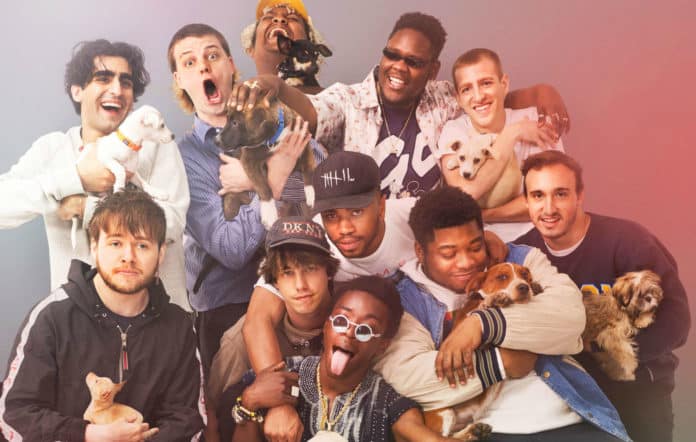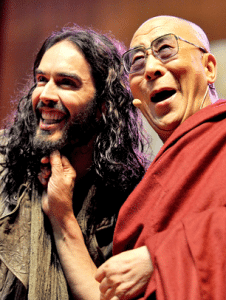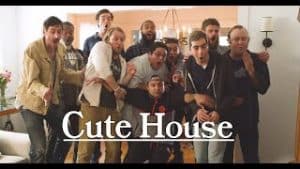
Prefatory statement/confession/justification:
At What Is Metamodern? we are cultural generalists. We seek to call attention to the metamodern sensibility as found in myriad areas of culture and in a variety of genres. Naturally, it’s easiest to write about the areas one partakes of the most – areas where you know how to read/listen/watch, what the norms and expectations baked into the genre are, what has already been said about it, and so on. With BROCKHAMPTON, I must admit to flying a bit blind – I was not acquainted with them until recently, and don’t know a lot about hip-hop! But I feel in this case that my job has been made a bit easier by BROCKHAMPTON themselves, in that they are what I have dubbed “post-genre” – that is, they push outside of genre restrictions, giving a generalist like me more to grab onto. Hip-hop may be the major idiom they work through, but they also self-consciously draw from other forms and subcultures that suit their creative needs. (FYI Post-genre itself is a subset of an aesthetic method I call constructive pastiche. I explain constructive pastiche and several other metamodern methods mentioned in this article, such as life-as-movie and oscillation, in much greater detail here.)
BROCKHAMPTON is a U.S. hip-hop collective that breaks a number of norms. For example, they prefer to be called a “boy band” – because they want to redefine what boy band means (and for other reasons… It’s a big topic in every online article about them). The members are Black, Brown, and White, gay and straight, American and international (Irish), and bring a variety of musical and artistic backgrounds to the group. What seems quite unique about their organization is that individuals in supporting but non-musical roles, such as their graphic designer, photographer and social media runner count as full members of “the band.” While hip-hop is generally categorizable as a postmodern genre (because of its frequent use of sampling and recontextualizing of prior work, instrumental minimalism, and origins during the height of the “postmodern era” in the 1970s and 80s), BROCKHAMPTON is one hip-hop act that seems to be landing in the metamodern aesthetic zone.
The group was created in 2010 by Kevin Abstract – 14 years old at the time – when he pulled together some high school friends with others he’d met by posting in a Kanye West forum: “Anybody wanna make a band?” With a band name and an idea, the original members all relocated to Los Angeles and moved into a house together. They shared their lives and their art-making in a metamodern inversion of the reality-show trope: Instead of a television producer selecting a set of individuals from a massive pool of contenders and throwing them together under artificial circumstances, this is a group of people who chose each other and chose to make their lives into music with the group experience being perhaps as much a part of the project as the music itself. Sort of an example of the “life as movie” sensibility that we have touted as one of the sensibilities of metamodernism.
Perhaps because of their communitarian origin, mutual support and personal growth are major themes in many of BROCKHAMPTON’s songs. “No Halo” – the first track on their newest album, Ginger – comes across like a late-night, post-party, personal sharing session. (Listen/View above.) In each verse or section of the song, a different member of the band reveals his insecurities, moral doubts, emotional pain, and so forth. All of these confessions are then glued together by a hook/refrain sung by guest vocalist Deb Never. (Contributing to the cross-genre dimension of BROCKHAMPTON, Deb Never is an Asian-American folk-emo singer-songwriter.)
The hook and bridge establish a metamodern oscillation between doubt and certainty:
Hook: “I don’t know where I’m goin’ / If I gotta take the high road, I’m rollin’”
Bridge: “I’m sure I’ll find it / No one help me when my eyes go red”
As mentioned, each verse is like a different band member taking his turn to disclose an issue he is struggling with. Not saying that every verse has a strongly metamodern theme, but that collectively they evoke a sense of connection-embracing-fragmentation. First, Matt Champion describes a painful visit to his ex’s home in which he witnesses her cuddling with a new boyfriend. Implicit in his description of the currently wrecked state of the relationship is the joy it once brought him. “… Use to be so perfect, but it’s never getting solved.” The use of the present tense “never getting” suggests a sort of ongoing oscillation between possibility and the closure of that sense of possibility.
Next, Merlyn Wood’s verse is a man waxing philosophical as he takes account of his place in life, and considers that his aspirations to spiritual transcendence may have left him in a place with diminishing real-world options. “…Do I matter? I’m ecstatic, I’m depressed. More like God’s special mess, never had no halo.”
Speaking of depression, the following verse by Dom is a testimonial about such mental health challenges that concludes with a defiant call to pull through:
“… But I believe to an extreme / (And we all can find a way) / To anybody listenin’, that’s in between / (And we all can find a way).
JOBA, in his verse, tells of returning to church “for the hell of it” after catching himself thinking he’s better than God (“Him”). He observes, “Lost a part of me, but I am still here.”
Finally, Bearface seems to describe what may be going on for all of the friends: “Wash it out of all of me to feel the fire.” The song sets the various tales in succession to show, perhaps, that sharing them is a means of connecting to the vocalists’ collective inner strength. And yet, there remains a self-aware cautiousness about it all: “But you know, you know that’s a lie (no one help me when my eyes go).”
The official video for the song, which you can watch above, evokes an oscillation between intimacy and alienation. For example, many of the scenes feature the band members wearing shimmery suits made from thin, metallic, emergency blanket material. For me, this evokes two opposing reactions: 1) These suits feel cold and sterile. 2) There is a sense of coziness in the way that the artists seem to be keeping themselves warm and protected, albeit with unusual materials. Also there is a sense of comradeship in their sharing of a common “uniform.”
Another paradox/oscillation: The camera often tries to get close but finds the artists’ faces obscured by the camera’s own light. Also: At times the camera looks down from above – but only from a few feet above, suggesting a quasi-omniscience that is not quite far enough from the subjects to make entirely reliable observations. As Kevin Abstract has said: “We don’t write music for a universal statement; we just share our experiences. And that’s all it is.”
Here at What is Metamodern? we have defined metamodern works as those that oscillate between typically modernist and postmodern qualities, while protecting and making space for interiority or felt experience. BROCKHAMPTON works in a genre that has historically employed postmodern methods such as sampling, pastiche, a populist attitude towards expertise and melodic minimalism. But the band combines these methods with a modernist sense of forward movement, hearkening to the possibility of psycho-spiritual transcendence. And it’s not just in the lyrics and the performance of the songs themselves; the entire narrative package the band presents suggests that something positive and nurturing is being constructed and shared, while still acknowledging an inescapable sense of fragmentation, both in the world and inside the individual. The braiding of these sensibilities yields something that feels new to us, and that may be seen as an example of metamodernism in hip-hop.
*****
For more on metamodernism in music, check out these earlier posts:



